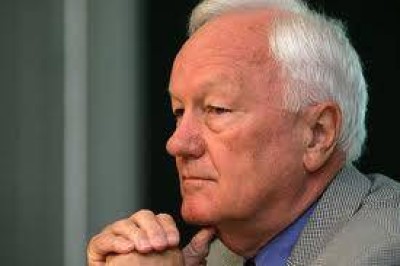Sizzle or sausage: ‘Plainsplaining’ the economy
ANALYSIS: What you need to know about the Kiwi money system.
WATCH: NBR columnist Nevil Gibson speaks with Calida Stuart-Menteath.
ANALYSIS: What you need to know about the Kiwi money system.
WATCH: NBR columnist Nevil Gibson speaks with Calida Stuart-Menteath.
Economics, like sports journalism, produces a bewildering array of commentary about an observable set of facts. So, it’s a highwire act to produce a book that attempts to explain how an economy works to those without expert knowledge. Call it ‘plainsplaining’.
It is even harder when that person admits to not being a practitioner of the discipline, a serious participant in ownership or management of a business, a top public servant advising a government, or running an investment fund of other people’s money.
Unlike attempts to popularise economics, such as Freakonomics or Economics for Dummies, which have quirky stories or replicate the lectures in Economics 101 courses, a journalist’s task is fraught with trying to dispel misinformation or deeply-ingrained prejudices.
In evidence, I offer this quote from a local writer:
“A well-worn tale that goes something like this: an economic (or other crisis) led to rising government debt, that National pretends is a consequence of Labour profligacy. This rising deficit is in turn a crisis that can only be fixed by austerity, a necessary evil with no economic alternative. It’s a story with heroes: the hard-working strivers and the politicians making tough choices to fix a broken economy. And it has villains: a bloated government, at once controlling and out-of-control; and the skivers: beneficiaries who are lazy and addicted to handouts. In this telling, economies can cut their way to growth. Slashing welfare and other public expenditure lowers taxes and increases the wealth available for private investment. Increased economic confidence stimulates enough private spending to compensate for the budget cuts. Except, it never works out that way. The story’s end is not a happy one.”
In a single paragraph it states an analysis of neoliberalism, except that it concludes this “well-worn tale … never works out that way”. Indeed, it has an unhappy ending.
If you agreed with this conclusion, plenty of others would say there is no evidence to support it. A fair-minded journalist might even try to unravel the truth after listening to a debate around a summer barbecue.

Liam Dann.
That is the purpose of Liam Dann’s BBQ Economics, a primer on a recent history of the New Zealand economy with insights on such issues as mortgages, house prices, and investing in shares, commodities, and bonds.
The cover has heavyweight endorsements from former prime minister and merchant banker Sir John Key, and investment guru Mary Holm. On the back cover they are joined by a former finance minister and a high-profile economist, among others.
I also have a disclosure: I attended two barbeques this summer where I chatted with the author ahead of the book’s release. We agreed the task was not an easy one, as business journalists face a daily assignment of writing for both informed readers and those who aren’t as much. It’s worrying that many others don’t fit either category and remain ignorant.
Wisely, Dann sticks to his own experiences after graduating in 1993 into a job market that had high unemployment. He was briefly on the dole, finding it an experience he wouldn’t want to repeat.
It is only natural, while approving the free-market reforms that opened the economy to greater consumer choice during his youth, he favours policies that trade lower unemployment for higher inflation. (It’s too early to say whether that would hold in today’s environment.)
This trade-off is just one conundrum the book aims to explain: how do you achieve the sweet spot of low inflation and high growth? Dann quotes from a 2023 interview with Sir Roger Douglas in which he denied there was a grand ideological plan in the mid-1980s reforms.

Sir Roger Douglas.
“I think it was more organic,” Douglas said. “We were faced with a problem, we needed to fix it. Had I been tribal in the sense of ‘Labour right or wrong’, I don’t think we would have necessarily done it.”
It’s a judgment that imbues Dann’s perspective that there is a middle course between extremes, be they those of Adam Smith and Karl Marx, or John Maynard Keynes and Milton Friedman.
Dann tracks the patchy record of inflation, GDP growth, and productivity from the relative prosperity of the 1950s and 1960s to the turbulent 1970s and 1980s, when oil price shocks, the loss of access to the UK market, and high interest rates threatened the economy.
The political responses were not always sound, as any economist would agree. “Humans are a strange bunch, as we complicate economics with our weird psychology,” Dann observes on why some poor decisions are made.
In the book’s second part, Dann focuses on housing issues, mortgages, debt, and investment. Again, he steers a middle course, lamenting the “cheap” sale of the commercial banking system to foreign (mainly Australian) interests, and the preference for putting “unproductive” capital in housing. “We sold the banks and got houses in return,” is one way to describe it.

But, as an asset, housing is still better than gold. (Dann does not mention the contribution of housing to New Zealanders’ high wealth ranking per capita in surveys by Credit Suisse and Knight Frank.)
One interesting revelation, compared with mortgage markets in the US, for example, is the Kiwi preference to fix mortgage rates for short terms of one to two years.
The perils of the financial system warrant serious analysis, particularly when politicians intervene. This country paid a high price when Kevin Rudd, the volatile leader of the Australian Labor federal government, responded to the global crisis in 2008 by guaranteeing all deposits, regardless of the risk. It forced New Zealand into a deposit guarantee system without consultation.
For his perspectives on business, Dann draws from interviews with business leaders such as Graeme Hart, Theresa Gattung, Sir Owen Glenn, Sir Stephen Tindall, and Rod Drury. Hart, who made his billion-dollar fortune from high-risk plays, is compared with Kiwi mountaineers and racing car drivers. The prosperous Swiss and Finns are also famous for these activities.

Graeme Hart.
In Hart’s words: “We don’t play a lot of golf”, a reference to his team of executives who balance high debt with tight control of costs, and ensuring income always exceeds outgoings. It’s a formula that Dann would recommend to any household – or government, for that matter.
Citing another example of exemplary advice, Dann quotes the words of Warren Buffet’s partner, Charlie Munger, who died recently aged 99. He liked to keep things simple: “Micro-economics is business; macro-economics is what you put up with.”
Dann attended an annual meeting of Berkshire Hathaway in Omaha, Nebraska, where the two legendary investors would share their knowledge with thousands of shareholders. As a journalist, Dann has also benefitted from first-name terms with senior politicians, Reserve Bank governors, and the heads of government departments.
His description of the differences between Key the prime minister and Graeme Wheeler the Reserve Bank governor as those of a gambler and a thinker don’t usually make it into newspaper columns. This reflects an approach that puts colour into topics that often elude accessible commentary.
The avoidance of business jargon is a strong attribute of New Zealand journalism. In my reading, BBQ Economics does not contain the words ‘sustainable’ or ‘eco-system’ and, for that reason alone, is well worth reading before your next barbecue.
BBQ Economics, by Liam Dann (Penguin).
Nevil Gibson is a former editor at large for NBR. He has contributed film and book reviews to various publications.
This is supplied content and not paid for by NBR.
Sign up to get the latest stories and insights delivered to your inbox – free, every day.